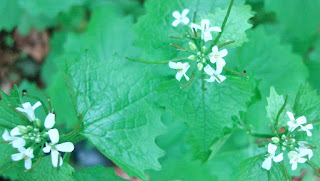Readers may remember that I wrote earlier this year about the growing enthusiasm for the preservation of a piece of parkland across the street from my house. These woods had been threatened by an ill-conceived plan, roundly defeated at town meeting, for their development. One of the several benefits from that attention was an Earth Day clean-up. While I was enjoying some welcome mother-daughter time in Phoenix on the day of the event, my husband contributed hours removing invasive plants, construction debris, and general trash from the woods. Every one's efforts energized the neighborhood and received some good local press.
Since I missed the fun, last week I went to check out the results. Spring in these New England woods is cool, green, and fresh. Pockets of different plant species are nestled in the dips and slopes of the land. There are colonies of native wildflowers, such as trout lily, jack-in-pulpit, and Solomon's seal.
 |
| Trout lily (Erythronium americanum) |
 |
| Jack-in-the-Pulpit (Arisaema triphyllum) |
 | |
|
Also on view were patches of invasive plants which, lovely as they might be in bloom, were busy displacing native species. These lilies of valley, for example, were battling with a spread of Solomon's seal for space.
Black jetbead (Rhodotypos scandens), which was introduced as an Asian ornamental in 1866, is able to grow anywhere--in sun or shade, in wet or dry conditions, in acid or alkaline soils, in polluted or salty air. Its ability to form a thick understory, pushing out native species, renders black jetbead a threat in Massachusetts. And its white spring flowers look so very innocent!
And, of course, there was the ubiquitous garlic mustard (Alliaria petiolata). I've read that you can eat this plant--it was after all introduced into this country as a culinary herb in the 1860's--which would make the occasional human consumer its only predator.
I realized that there will be lots more work to be done. Before I headed home, I loaded up my pockets with discarded chip wrappers and soda bottles and pulled up an armload of invasive plants. Every bit helps, I hope.






No comments:
Post a Comment